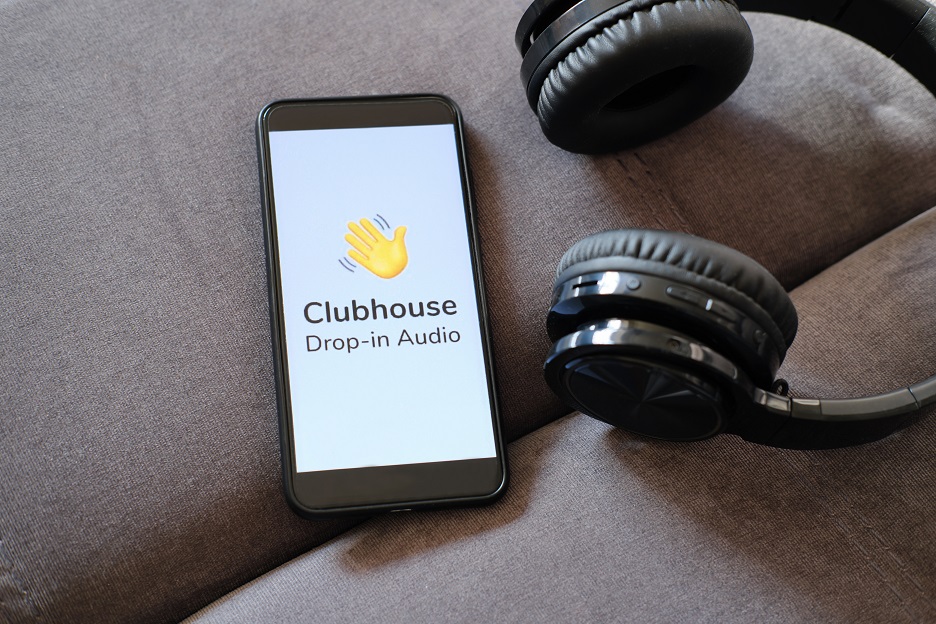The social media landscape has evolved drastically over the years. There are now multiple social platforms, each with different specialised characteristics.
For example, Twitter provides its users with a platform to share news and views; Instagram hosts stylised visual content; YouTube is the king of video; while TikTok’s short-form video content provides users with light-hearted escapism.
And now we have a new social platform that allows users to share and interact with audio-only content. This new platform is Clubhouse.
The emergence of Clubhouse
Since the pandemic stripped us of live events and the privilege of casually listening and contributing to random, in-person conversations, it seems logical as to why a social media platform that allows us to do just that has risen in popularity.
Additionally, the rise of podcasts and the increasing Zoom fatigue, has spurred on the emergence of Clubhouse. For many, the app creates a break from the endless screen time we are now accustomed to, with one Vogue journalist describing that she had downloaded Clubhouse because she felt ‘Zoomed out’.
What is Clubhouse?
Clubhouse launched back in March 2020 and describes itself as ‘a new type of social product based on voice’. The new social platform has been valued at $1bn, with its popularity and user base growing rapidly. It recently doubled in size between February 1–16 2021, now with 8.1m app downloads from the app store.
It’s currently still in the beta stage of development and only available on iOS. It also operates using an invite-only model, meaning membership is much more exclusive than other social media platforms which has also helped it gain intrigue.
Clubhouse is fast becoming the new ‘it’ platform, but how exactly can businesses use it to facilitate their marketing and influencer marketing efforts?
How do I use Clubhouse and what does it offer businesses?
The layout of the app is straightforward to use, with the home page listing different rooms for members to visit. Each room houses a different conversation, with Clubhouse offering an extensive range of conversation topics for both consumer and corporate audiences from guided meditations to panel discussions. Members can create their own conversations or join any room and, if they wish to get involved in the conversation, can ‘raise their hand’ to participate.
Clubhouse is particularly appealing to brands for its high levels of engagement. Members in each room have consciously chosen to tune in, meaning the listener is actively interested in the topic. For example, a woman looking to redecorate her house might gravitate towards rooms that feature interior designers and lighting experts having conversations around how to style a room.
The opportunity here is for brands to put themselves at the forefront of relevant conversations and emerge as experts in their industries. Regarding the above example, an interior design business would increase its brand awareness by having one of its designers participating in the above conversation with an interested audience including potential clients listening in.
Marketing opportunities for small businesses
Join a relevant room
Clubhouse also provides brands with valuable networking opportunities. By joining a room with a prominent business figure on a topic relevant to your brand, you can offer meaningful and insightful contributions. Provided the contribution is authentic and useful to the audience, this can help to enhance your personal profile and even drive new leads.
Clubhouse can also function as a brand awareness platform for companies by creating content that sparks a conversation organically, whilst ensuring they are at the centre of this conversation.
Sponsored rooms
Clubhouse is a social platform where success is determined by the quality of the content produced, not the popularity of the brand. The opportunity here is for brands to sponsor rooms with interesting and engaging content as a way to reach smaller, more intimate communities. It allows brands to emerge as thought leaders, giving them an authentic and purposeful voice.
Clubhouse is about the sharing of knowledge and experience. It allows brands to build intimate communities made up of highly engaged, existing or potential customers. Brands need to be mindful of sponsoring rooms that are likely to resonate with their customers and not see sponsorship on Clubhouse as simply a means to churn out branded content.
Brands may also use Clubhouse to reach a new audience by sponsoring discussions this new audience is known to be interested in.
With Clubhouse, brands should approach sponsoring rooms by first taking into consideration the listener’s experience. The lack of visuals presents a challenge for brands to navigate. Additionally, radio adverts can’t simply be replicated identically on the platform. Highly promotional adverts are likely to jar with the format of the platform which focuses on informal conversation.
Clubhouse is working to make the platform brand friendly by introducing ticketed rooms. These rooms will house closed-door discussions and allow users/brands to host events on an invite-only basis making Clubhouse a highly targeted platform for brands to sponsor.
The use of influencers on Clubhouse
Influencers have proven themselves to be highly adaptable to a variety of social platforms. Since its inception in 2016, many creators successfully transitioned to TikTok and have helped brands make the leap too. For example, last year we supported Wickes on the UK’s first ever home improvement sector campaign on TikTok. Clubhouse has sparked a similar migration, with some savvy influencers building their presence on the platform and establishing themselves as ‘moderators’.
> See also: 5 tips to make your small business TikTok marketing a success
Clubhouse also appears to be investing in influencers by creating a fund for a ‘Creator Grant Program’. This indicates the value Clubhouse sees in influencers and their content on the platform. Brands are already realising the platform’s potential and looking to get ahead of their competitors by also investing in influencer partnerships.
For example, brands could partner with influencers to host a weekly conversation that incorporates the brand’s key messages. Due to Clubhouse’s live format which facilitates direct consumer interaction, influential creators with highly engaged followers can produce powerful and authentic branded content.
What the future holds for Clubhouse
As a new social platform, it’s hard to determine how Clubhouse will evolve but it’s already showing plenty of early potential.
Interestingly, Clubhouse has been designed to work alongside other social media apps, rather than compete with them. You can listen to a conversation whilst scrolling through Instagram for example. Clubhouse is also directly linked to members’ Instagram and Twitter profiles. This means that a brand can directly build its followers on Instagram and Twitter by hosting and contributing to conversations. If members like what they hear from a brand, they are likely to explore the brand on other platforms.
> See also: Your 4-step guide to setting up an Instagram business account
However, Clubhouse still has a long way to go from its current beta stage of development. Social media giant Twitter has launched ‘Spaces’ which is likely to compete with Clubhouse, so it will be interesting to see how Clubhouse differentiates itself in response.
Nevertheless, Clubhouse presents a huge opportunity for many brands, but in particular, smaller brands that now have a new, less cluttered social media platform at their disposal. The earlier they join, the more opportunity there is for these brands to grow on Clubhouse.
Small brands and small brand owners can now start to host and participate in conversations they may never have had access to before. It will be exciting to see what the future holds for Clubhouse and the brands using it.
Jim Meadows is the chief strategy officer at TAKUMI.





